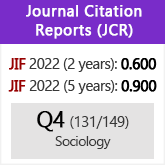The Theatrical Metaphor in Social Interaction
DOI:
https://doi.org/10.3989/ris.2008.06.17Keywords:
Homo sociologicus, Regularities, Ritual, Rol, Social RealityAbstract
The scientific description of some phenomena makes normal use of metaphors in order to facilitate its research and understanding. Sociological theory uses rol to identify the shared expectations of behavior in social interaction. This theatrical, or dramaturgical, metaphor allows the construction of the notion of homo sociologicus through which it is possible to perceive social regularities that may be labeled as rituals, adding a great heuristic capacity to the idea of ritual drama. But it is necessary to keep in mind the epistemological risk of supposing that our knowledge of social reality is a mirror of nature, forgetting its ambigüities and contingency.
Downloads
References
Aron, R. 1969. Progreso y desilusión. Caracas: Monte Avila.
Beauvoir, S. de. 1949. Le deuxième sexe, 2 vols. París: Gallimard.
Burke, K. 1969. A Grammar of Motives. Berkeley: University of California Press.
Burke, K. 2003. La filosofía de la forma literaria y otros estudios sobre la acción simbólica. Madrid: Ed. Antonio Machado.
Castillo Castillo, J. 1983. “El molesto hecho de la sociedad”. En J.R.Torregrosa y B.Sarabia, dirs., pp. 147-161. Perspectivas y contextos de la psicología social. Barcelona: Ed.Hispano Europea.
Dahrendorf, R. 1973. Homo sociologicus. Madrid: Instituto de Estudios Políticos.
Dahrendorf, R. 1979. Life Chances: Approaches to Social and Political Theory. Londres: Weidenfeld y Nicholson.
Derrida, J.1967. De la grammatologie. París: Minuit.
Goffman, E. 2006. La presentación de la persona en la vida cotidiana. Buenos Aires: Amorrortu.
Goffman, E. 1979. Relaciones en público. Madrid: Alianza.
Heller, A. 1980. Por una filosofía radical. Barcelona: El Viejo Topo.
Infantino, L. 1995. L’ordine senza piano. Roma: La Nuova Italia Scientifica.
Joas, H .1998. El pragmatismo y la teoría de la sociedad. Madrid: Centro de Investigaciones Sociológicas.
Lakoff, G. y M. Johnson. 1991. Metáforas de la vida cotidiana. Madrid: Cátedra.
Luque, E. 1988. “Rito y ritual”. En Román Reyes dir., pp. 873-878. Terminología Científico-social. Aproximación crítica. Barcelona: Anthropos.
Naegele, K. D. 1961. “Interaction: Roles and Collectivities”. En Parsons, T., Shils, E., Naegele, K.D., y Pitts, J.R., eds. pp. 147-157. Theories of Society. Foundations of Modern Sociological Theory, 2 vols. Nueva York: The Free Press of Glencoe.
Ortega y J. Gasset. 1957. “Las dos grandes metáforas”. El Espectador. IV. (1925). Obras Completas, vol.II, Madrid: Revista de Occidente.
Ortony, A. ed. 1979. Metaphor and Thought. Cambridge: Cambridge University Press.
Parsons, T. 1961. “An Outline of the Social Systems”. En Parsons, T., Shils, E., Naegele, K.D., y Pitts, J.R., eds., Theories of Society. Foundations of Modern Sociological Theory, 2 vols. Nueva York: The Free Press of Glencoe.
Parsons, T. 1968. La estructura de la acción social, 2 vols. Madrid: Guadarrama.
Rorty, R. 1983. La filosofía y el espejo de la naturaleza. Madrid: Cátedra.
Simmel, G. 1977. Sociología. Estudios sobre las formas de socialización. 2 vols. Madrid: Ed. Revista de Occidente.
Wrong, D.H. 1961. “The oversocialized conception of man in modern sociology”. American Sociological Review 26:183-193 doi:10.2307/2089854
Downloads
Published
How to Cite
Issue
Section
License
Copyright (c) 2010 Consejo Superior de Investigaciones Científicas (CSIC)

This work is licensed under a Creative Commons Attribution 4.0 International License.
© CSIC. Manuscripts published in both the printed and online versions of this Journal are the property of Consejo Superior de Investigaciones Científicas, and quoting this source is a requirement for any partial or full reproduction.All contents of this electronic edition, except where otherwise noted, are distributed under a “Creative Commons Attribution 4.0 International” (CC BY 4.0) License. You may read here the basic information and the legal text of the license. The indication of the CC BY 4.0 License must be expressly stated in this way when necessary.
Self-archiving in repositories, personal webpages or similar, of any version other than the published by the Editor, is not allowed.

















